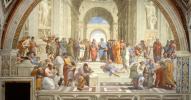Epicurus (341-270 BC)
The misunderstood ascetic
This article is part of a year-long series of trying to live six different philosophies of life, gently coached by the Daily Philosophy newsletter, which you are very welcome to join so that you never miss a post!
Epicurus (341-270 BC)
When one hears of Epicurus today, it’s generally in the context of good food or other pleasurable enjoyments.

Source: Epicurious
And the American Heritage Dictionary defines “Epicurean” thus:
- Devoted to the pursuit of sensual pleasure, especially to the enjoyment of good food and comfort.
- A devotee to sensuous and luxurious living; an epicure.
But this is quite a misunderstanding, as we will see later.
Epicurus was born around 341 BCE, seven years after Plato’s death. He grew up in the Athenian colony of Samos, an island in the Mediterranean Sea, close to what is today the shore of Turkey.
Like Aristotle and many other famous Greek philosophers, he was not a real Athenian – he did have the citizenship, but he was one from the colonies, not a member of one of the core Athenian tribes. But also, like Aristotle and many others, he was attracted to the legend of Athens, its democracy, its market and splendid public buildings, where all sorts of philosophers, from the finest in the known world down to the crazy preacher of the day, would give speeches and teach their students. If you were a young philosopher at around the fifth or fourth century BC, then Athens was the only place worth being.

Aristotle (384-322 BC)
Aristotle (384-322 BC), born in Stageira, Greece, is one of the most influential philosophers who ever lived. He worked not only in philosophy, but also wrote dozens of books on all topics, from astronomy and biology to literary theory.
Epicurus was about 19 when Aristotle died and he studied philosophy under followers of Plato and Democritus. Democritus had developed a theory of atoms, tiny, indivisible particles of matter, and Epicurus saw in this a way out of superstitious beliefs in Gods, spirits and fate. If everything was indeed atoms, then the world was a purely material place. Even the human mind must then be made of these atoms and the laws that govern our thoughts must be, in principle, as rational and understandable as those governing the movement of a horse-cart or a ball rolling down a slope. We will see later how this belief in atoms allowed Epicurus to remove one of the main causes of anxiety and fear for the people of that time: the fear of the wrath of the Gods. If the world was just atoms flying around, then the Gods had no say in its destiny and there was nothing to fear.
Like Aristotle, Epicurus too travelled quite a bit around the Greek world before he settled in Athens, and not always voluntarily. The Athenian population was expelled from his birthplace Samos when he was young, and his family was forced to move to Colophon, a short distance away on the Asian shore. Later he moved to Mytilene to teach, but his teachings about the world being only atoms rather than the domain of gods caused so much trouble that he was forced to flee from there. And so he ended up in Athens at around 306 BC, in the hope that he would find more tolerance there for his unorthodox beliefs.

In Plato’s Symposium, Plato defines love as the desire for the eternal possession of the good.
The Garden
The problem was that Epicurus wasn’t a true Athenian – and the Athenians were pretty fed up with penniless philosophers coming to their city from all parts of the world to question the local religion and to insult their gods.
It didn’t help that Plato kept reminding them forever in his dialogues of how they had unjustly killed his teacher Socrates so long ago, and that Aristotle, another thinker from the provinces, had ended up teaching Alexander the Great, the son of their enemy Philip of Macedonia. So the citizens of Athens decided that they had enough. They made a law that only proper Athenian citizens were allowed to teach philosophy in Athens. If you were, like Epicurus, a foreigner, you were welcome to do honest work – but you’d better keep your mouth shut in public places.

Epicurus. Source: Wikipedia.
So Epicurus couldn’t just go to the Stoa, like the Stoics did, or teach in Plato’s Academy (even if they would have him). The only possibility was to invite his followers to his own house, away from the eyes of the public. And so he bought a house with a beautiful garden and this garden (“the Garden”, with a capital “G”) became one of the symbols of Epicurean life: detached, quiet, peaceful, seeking and finding the ultimate joy surrounded by friends and nature.

A Stoic is an adherent of Stoicism, an ancient Greek and Roman philosophy of life. Stoics thought that, in order to be happy, we must learn to distinguish between what we can control and what we cannot.
Epicurus’ garden and the group of “friends” who met there were also remarkable for another peculiarity. Epicurus himself had been the son of working parents: his father was a teacher and, by some accounts, it seems that his mother might have been a fortune-teller. So Epicurus knew the world of working people, unlike many other Athenian philosophers who had been born into the aristocracy and never worked a day in their lives. And Epicurus never forgot how life had been for him as a child and for his family. So when he opened his own school of philosophy, he made sure that everyone would be allowed to attend his lectures: not only the sons of the rich, but also working people and even slaves, and, perhaps most scandalous of all, women. So Epicurus might be up there with Sappho, the lesbian poet, and Aspasia, the wife of Athens’ Golden Age ruler Pericles – as one of the first supporters of women’s emancipation in the ancient Greek world.
Epicurus’ legacy
Epicurus, trying to give his followers courage even in times of illness, once wrote:
In an incredible stroke of bad luck, as if the gods wanted finally to take their revenge on the faithless philosopher, they gave him kidney stones at the end of his life: the most painful, long drawn-out death imaginable, a direct refutation by example of his Principal Doctrine number four.
Epicurus remained immensely popular for centuries after his death. In his classic “St Paul and Epicurus” (1954), Norman DeWitt points out the similarities between the peaceful, bearded face of Epicurus, known from statues all over the Greek world – and the peaceful, bearded face of Jesus.
Daniel Klein: Travels with Epicurus.
A wonderfully human meditation on old age. A man travels to a Greek island with a suitcase full of books, in search of a better, more dignified way to age.
Amazon affiliate link. If you buy through this link, Daily Philosophy will get a small commission at no cost to you. Thanks!
When St. Paul (AD 5-67), 300 years later, was trying to teach the Christian message, he had sometimes trouble explaining the difference between Christianity and Epicureanism to his audience. Both talked of friendship. Both were discussed in small communities that met in private homes. Both taught indifference to worldly riches, benevolence and moderation. The Epicureans were known everywhere as the “friends of Epicurus”. The concept of friendship was so strongly associated with Epicurus that St Paul avoided the word itself, according to DeWitt, preferring to speak of love instead.

The question about the nature of love has plagued philosophers from the ancient times to today. In this mini-series of posts, we trace the history of the concept of love from Plato and Aristotle through the Christian world to the Desert Fathers of the 5th century AD. In the next post, we will discuss the medieval and romantic concepts of love.
And so Epicurus’ message stayed on, even through the holy texts of those who thought him an enemy. He was luckier than many other ancient philosophers in that we have two pretty complete books describing his ethics: the Principal Doctrines and his Letter to Menoeceus.
In the coming days and weeks, we will not only take a good look at these Epicurean books – we will also try to see whether (and how exactly) the ideas of the bearded philosopher of friendship can be used to live a better life today, in our own world. Stay tuned!
The Art of Happiness is a collection of Epicurus’ writings related to his philosophy of happiness. Epicurus is easy and entertaining to read and has a lot to teach us in our modern (and often misguided) societies about how to live a happy life.
Amazon affiliate link. If you buy through this link, Daily Philosophy will get a small commission at no cost to you. Thanks!







